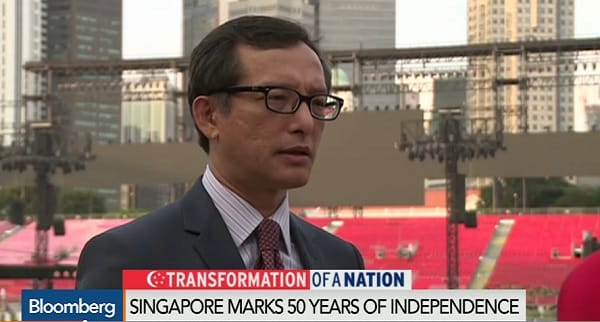SIIA Chairman Simon Tay was interviewed by Bloomberg’s Haslinda Amin on “First Up” on Singapore’s history and SG50, on how this little red dot has become so successful. A transcript of the interview, originally broadcast on 6 August, is available below.
Q. Many people credit Singapore’s policies for the success that we have. What exactly are some of the policies that have driven the country’s success?
Prof. Tay: I think clearly, one, first, is that the government decided it must lead. So in the early days of Singapore, whether it was public housing or trying to build the military, or even start companies like Temasek today, Singapore Airlines, SingTel, these really were initiatives of the Government. And the Government itself was the entrepreneur, not just the regulator, but really took these ideas and ran with them.
Q. So basically the country thought out of the box. If you take a look at F1 for instance, Malaysia held the F1 race earlier than Singapore did, yet we were the first country to hold a night race, so it is a matter of thinking outside the box.
Prof. Tay: That’s very true. So once we’ve built that foundation, we had room to bargain with people like F1. So we could say, if you want to do this, we’ll do it slightly differently, or when we brought the casino in. But once the base was built, then we could extract that value. But this is tweaking on good ideas and making them better. But one of the challenges facing Singapore going forward is what it means to be entrepeneural, to find new paths, and not just be an early adopter, a clever tweaker of ideas, but to find new ways to grow this country.
Q. It’s also come under criticism for being a Government that ruled with an iron fist. Fair assessment? Was that what was needed?
Prof. Tay: I think, in the early years, clearly. In the early years there were external problems with Indonesia, with Malaysia, and that’s why the military background is so important to Singapore’s National Day. It was the early glue that really held Singapore together and gave that that promise that we would be okay. But the second element that really came in is the internal. As you said this country really has so many different races, different religions, and there have been racial riots in the years before we became independent. How did we ensure that there would be this harmony? So the Government had a very strong authoritarian rule in the 60s, 70s, after the Emergency, after the racial problems. But I think it’s becoming more liberal, more progressive today.
Q. How did Singapore find its relevance in the global economy?
Prof. Tay: We were lucky. We discovered we were really so small we could not have an internal market. So when countries were part of the Soviet Union, or Communist China, even India and Brazil, thinking they could develop their own market, we knew we couldn’t. So when they were closed, we were open. So when we celebrate our 50th anniversary, you find a lot of multinationals, foreign nationals, people who have lived here all their life – even if they’re not Singaporean, are celebrating with us. We’ve been part of their story, and they’ve been part of our story.
Q. Singaporeans today complain about the exorbitant prices of homes. Yet the housing policy was crucial in bringing the people together in the early days.
Prof. Tay: I think that’s critical. We really had a severe shortage of housing in the early years, people were crammed into squatter tenements in Chinatown, not really picturesque, but they were really crammed in there in those days. So the Government had an early breakthrough. Costs in Singapore are now…not just for housing, but overall, an issue. For Singaporeans, first and foremost, but also the multinationals. I think this will have to be addressed going forward. But that’s part of the problem now – facing success. We’re facing a new bunch of challenges.
Q. You’re a Singaporean, you grew up here. And this particular spot is significant to you – as a child, you came here with your dad.
(Transcriber’s Note: The interview took place at the Padang)
Prof. Tay: Yes, my father was a civil servant, he served with Mr. Lee Kuan Yew and Dr. Goh Keng Swee, and yes, it was pleasure to be here in the 60s as a kid. And I hope there will be more kids enjoying this, because Singapore needs that optimism for the future. We need to invest in our young, we need to make them part of this country, even as they become global citizens. So maybe the new catchphrase is ‘global citizens, Singapore’.
Q. It is a significant milestone for Singapore. Looking back, how do you feel the nation has come so far in a very short time?
Prof. Tay: Well, a lot of it has to do with the currents of our region, the direction of the global economy. The global economy has gone more open, the global economy has helped Asia as a whole, and we happen to be… it used to be that we were in the middle of a troubled region, but right now we’re in the middle of one of the most dynamic regions. Really, there are challenges ahead, but if everyone thinks Asia is rising, Asia needs a hub. Asia needs a capital. We can be one of those hubs.




